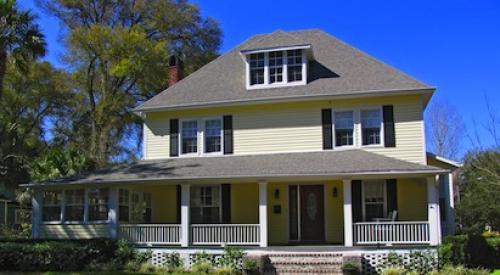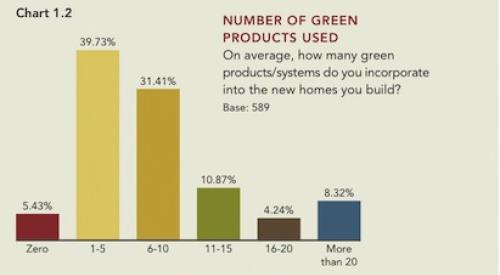Because many Chicago residents retire in Fort Myers, Fla., we thought it would be interesting to feature both markets. Chicago is an established market where a lackluster economy appears to be on the rebound. To the contrary, Fort Myers is a new market where housing construction is driving an unsustainable boom.
Giant Market: ChicagoWith nearly 3 million households in its eight-county area, the Chicago market is truly a Giant market. The metropolitan area ranks seventh in the nation in single-family permit activity and fifth in total permits. Total permits have doubled in the last 15 years to nearly 46,000 permits for the 12 months ending in February.
The economy in Chicago appears to be picking up speed. After job losses during 2001–2004, employment growth has returned, with more than 43,800 jobs added in the last 12 months. Much of that growth has occurred in the high-paying professional/business services sector, which is second in total jobs to the trade/transportation/utilities sector. And, with a ratio of employment growth to permits of approximately 1.0, housing demand and supply are currently in balance.
In the latest market risk report from The PMI Group, Chicago was given only a 15 percent chance of a decline in home prices over the next two years, versus a 29 percent chance for the nation. Except for a slight dip in late 2004 to early 2005, the median existing home price has risen each quarter since 1982; its current value is $238,000.
Infill and teardowns are attractive in Chicago proper and a trend in the suburbs as well. Demand for affordable housing is spurring development in the southwest counties.
Up-and-Coming Market: Fort MyersThe 11th largest housing market in the country receives almost no attention in the press, but that will change soon. In the last three years, the number of building permits issued in Florida's Lee County, the metropolitan area of Fort Myers, has almost tripled, to nearly 29,000 permits issued over the last 12 months. That level is only 6,000 fewer permits than were issued in Orlando, Fla., and 3,000 fewer permits than were issued in the entire 15-county Washington, D.C., metropolitan area. At its current rate of growth, Fort Myers will surpass the almost 35,000 annual permits issued in both Tampa, Fla., and Orlando.
Retirement housing, second homes and investor activity — mostly from the Midwest — are behind the surge in demand. In fact, a recent study from the National Association of Realtors found that Midwesterners purchase the largest number of vacation homes across the country. But although the demographics for second homes and retirement homes are strong, they don't explain a sustainable 18,000-unit-per-year surge in building permits. In the short-term, this market is probably overbuilt, which will result in more competitive market conditions later this year. In the long-term, Fort Myers will be a great market because of the high number of retirees who will relocate to Florida and find Fort Myers more affordable than nearby Naples and Sarasota.
| Affordability | Permits | |||||||||||
| Short-Term Outlook/Grade | 1-Year Payroll Employment Growth | 1-Year Growth Rate | Unemployment Rate | Median Resale Home Price | Resale Housing Costs as % of Income* | Housing Cycle Barometer* | 12-Month Single-Family Permits | 1-Year Single-Family Growth | 12-Month Total Permits | Total Permits as % of Peak Permits*** | ||
| 1 | Atlanta | B | 67,400 | 2.94% | 5.1% | $173,085 | 29% | 5.8 | 60,744 | 5.6% | 72,607 | 98% |
| 2 | Phoenix | B+ | 108,400 | 6.22% | 3.9% | $260,000 | 41% | 6.7 | 52,325 | -11.7% | 61,994 | 93% |
| 3 | Houston | A | 78,500 | 3.41% | 5.3% | $142,900 | 25% | 5.1 | 51,800 | 12.9% | 62,658 | 83% |
| 4 | Riverside-SB | D | 35,800 | 2.99% | 4.7% | $375,000 | 67% | 9.5 | 46,486 | 9.1% | 52,226 | 91% |
| 5 | Dallas | A | 71,200 | 3.73% | 5.0% | $157,500 | 25% | 4.6 | 33,892 | 5.4% | 40,808 | 55% |
| 6 | Las Vegas | B+ | 57,700 | 6.86% | 3.8% | $300,000 | 49% | 7.3 | 31,134 | 1.9% | 39,412 | 100% |
| 7 | Chicago | C | 43,800 | 1.19% | 5.3% | $238,000 | 40% | 6.4 | 28,732 | 4.8% | 45,983 | 100% |
| 8 | Tampa | B+ | 39,600 | 3.11% | 3.2% | $185,000 | 37% | 6.2 | 27,151 | 13.9% | 33,164 | 87% |
| 9 | Orlando | B+ | 50,800 | 4.98% | 2.9% | $235,000 | 42% | 6.5 | 26,448 | -4.8% | 35,169 | 98% |
| 10 | Washington, D.C. | B+ | 58,400 | 2.54% | 3.0% | $405,000 | 51% | 7.5 | 22,242 | -3.2% | 32,007 | 84% |
| 11 | Fort Myers | D+ | 13,000 | 5.92% | 2.3% | $317,754 | 57% | 10.0 | 21,948 | 33.4% | 28,989 | 99% |
| 12 | Charlotte | B+ | 21,900 | 2.81% | 5.0% | $152,000 | 25% | 1.4 | 19,854 | 9.5% | 22,913 | 100% |
| 13 | Denver | A | 28,000 | 2.41% | 4.8% | $230,000 | 36% | 5.5 | 19,806 | 4.0% | 21,707 | 76% |
| 14 | Fort Worth | A | 21,100 | 2.64% | 4.8% | $112,700 | 20% | 5.0 | 18,757 | 15.7% | 21,079 | 55% |
| 15 | Jacksonville | B+ | 22,400 | 3.75% | 3.1% | $170,000 | 29% | 5.9 | 18,640 | 22.4% | 25,407 | 100% |
| 16 | Austin | A | 25,800 | 3.80% | 4.2% | $166,100 | 29% | 5.0 | 18,241 | 26.1% | 24,813 | 94% |
| 17 | Minneapolis | A | 26,700 | 1.56% | 4.4% | $234,000 | 32% | 8.9 | 17,349 | -13.0% | 21,988 | 78% |
| 18 | San Antonio | B | 17,000 | 2.22% | 4.7% | $127,100 | 25% | 1.8 | 15,392 | 22.3% | 24,130 | 100% |
| 19 | Sacramento | C | 27,600 | 3.19% | 4.8% | $375,000 | 63% | 5.0 | 15,085 | -15.6% | 17,631 | 74% |
| 20 | Raleigh | A+ | 18,600 | 4.13% | 3.8% | $173,500 | 27% | 9.8 | 14,171 | 15.0% | 15,762 | 98% |
| *** Peak activity since 1985. Sources: Bureau of Labor Statistics; Census Bureau through the month ending February 2006; John Burns Real Estate Consulting | ||||||||||||
| Author Information |
| John Burns helps with strategy and monitoring market conditions with many of the largest companies in the industry. He can be reached at jburns@realestateconsulting.com. |












